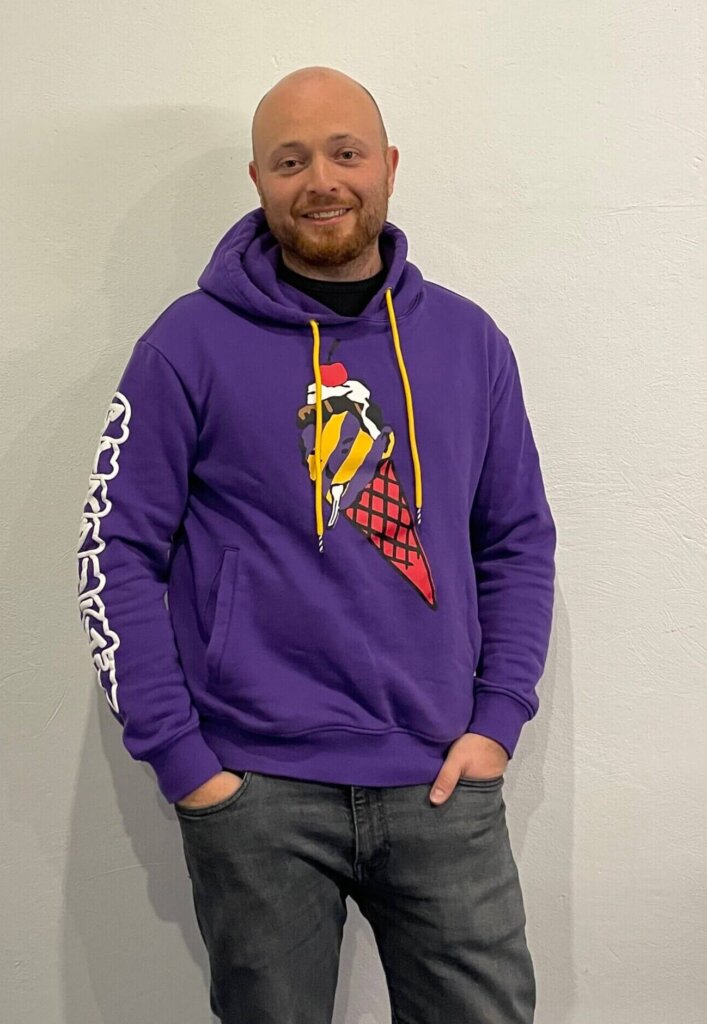‘The war has seriously crippled us’: In Ukraine, Jewish business owners persist
Three Ukrainian Jewish entrepreneurs talk about their work and faith as the Russian onslaught continues

Graphic by Angelie Zaslavsky
Sleeper, an internationally known fashion brand based in Kyiv, has moved 20 employees and part of its production to Turkey and is now scouting a manufacturing plant in Portugal.
At Pipes.One, a Ukrainian startup that uses mobile technology to produce industrial pipes at construction sites, engineers are working on the design of polymer bomb shelters to protect people from Russian bombs.
And Laba, one of the largest online education companies in Eastern Europe, chose to discontinue serving customers in Russia and Belarus immediately after the war began on Feb. 24 and downgraded its software from a system made by Russians. “The war has seriously crippled us,” said CEO and co-founder Jacob Feldman. “It’s like having a Toyota and then transferring to a horse-drawn carriage.”
All three of these young, successful businesses were founded and are run by Jewish Ukrainians. As the war grinds through its third month, I decided to talk to their leaders about how the companies are faring amid the assault — and how their Jewish identities informed their decision-making in this most challenging time. Here are brief profiles of the three companies and highlights from my interviews with their leaders.
‘As a family, war makes us stronger’

Sleeper, launched in 2014 when the revolution was roaring on Kyiv streets, makes leisurewear that is “ethically crafted” and “designed to make you feel beautiful,” according to its website. The founders, former fashion editors Kate Zubarieva and Asya Varetsa, were included in a Forbes’ list of successful Europeans under 30 in 2019, and have celebrity fans including Katy Perry, Brie Larson, Kourtney Kardashian, Zoey Deutch, Dakota and Elle Fanning, and Lena Dunham.
Zubarieva, 32, said she “turned to my Jewish origins” three years ago via the Conservative movement’s Masorti Olami, through which she has been studying the weekly Torah portion. She started studying Hebrew about 18 months ago, and recently resumed classes online after a break during the early weeks of fighting.
“I celebrated this Passover with our friends from the community and their children, a great festivity that gives so much strength and hope in these horrendous days of the war,” Zubarieva told me. “I feel myself a proud Jew.”
When the war began, Sleeper moved 20 of its 100 employees to Turkey along with the production facility, having learned during the pandemic how to function with remote workers. “None of our employees lost their job due to the war,” Zubarieva said proudly. “And as a family, war makes us stronger. We feel together as never before.”
The company donated the equivalent of $35,000 to the Ukrainian Army in the first month of the war, and suggests on its Instagram page Ukrainian-relief charities for foreign customers to support. In April, it donated the equivalent of $20,000 to a children’s hospital in Kyiv.
“We remember the main Jewish postulate that life is the most valuable and build our entire internal policy toward our employees around this,” Zubarieva said. “The wisdom of our sages and great Jews, in particular Golda Meir, helps a lot. I often re-read her biography and her quotes, because this is something that we can firmly lean on.”
‘Israeli technology companies inspire us’

Pipes.One, founded in 2005, sends mobile pipe production units directly to construction sites, so industrial plastic pipes can be made right where they will be installed. It introduced new technology in 2016 and received a grant of 1.5 million euros in 2020 from the European Union’s Innovation Council, the largest grant of its kind to a Ukrainian company. Co-owner Leon Ryrakhovsky, who is also the company’s chief financial officer, left Soviet-controlled Kyiv for the United States in 1988, when he was 26, to escape antisemitism.
“Though until that time I’d not been allowed to learn about Judaism,” Ryrakhovsky, now 59, told me, “I began to understand rather well the weight of the words God spoke to the first Jew, Abraham: Go forth from your land, your birthplace, and your father’s house.”
Arriving in Boston, Massachusetts, in 1989, he discovered that “being Jewish was something to be proud of, not hidden away,” and many of his Russian-speaking Jewish immigrant friends started to learn about their heritage and became active in local synagogues. After 20 years working as an investment banker, first at Paine Webber (now UBS), and then at his own company, Atlantic Capital Advisors, he returned to Kyiv in 2012 when, as he put it, “Ukraine was moving in the direction of democracy, freedoms, and tolerance with no presence of antisemitism.
“It feels strange sometimes how I have been driven away from my native land because I’m a Jew, and how now in the same city I’m respected and proud to be a Jew,” Ryrakhovsky said.
Like Sleeper, Pipes.One has not laid off any employees since the war began. It continues to upgrade its products, and to register trademarks across Europe, and hopes to take part in the rebuilding of water and sewer systems destroyed during the war.
“As Ukraine fights to defend European values and freedoms, we are striving to make our economic and technological contribution to make the world a better place,” he said. “Israeli technology companies inspire us. They show that the country can be at war, but technology and industrial innovations can be brought to the world in spite of the surrounding dangers.”
A sign that says ‘hineni’ – here I am

Laba, founded in 2015, offers 70 courses in human resources, finance, sales, public relations, marketing and other fields to corporate and individual clients in Ukraine, Hungary, Turkey, Poland, Romania, the Czech Republic, the United States and the United Kingdom. In 2021, the company added technology courses, and in February, it had about 400 employees and served almost 50,000 students per year.
Co-founder and CEO Jacob Feldman, 35, said he first stepped foot in a synagogue at age 21, and has since spent a few weeks at a yeshiva in Jerusalem and studied Talmud with a local rabbi. “In my post-Soviet Jewish family, being a Jew meant reading a lot of books, playing chess, and attending a music school, rather than praying,” he told me. “I do sometimes pray when my life gets into turbulence.
“I have a big sign in my Kyiv office saying ‘hineni,’” he added, using the Hebrew word for ‘Here I am,’ “so I believe my journey to Judaism continues.”
When the war broke out, the company’s first challenge was communicating with employees scattered across the country — and across Europe. “Talking about sales seemed to be irrelevant,” Feldman said, which — combined with the loss of the Russian and Belarussian markets — meant financial strain. He called a company meeting and asked people to take voluntary pay cuts in order to avoid widespread layoffs.
“Everyone voluntarily indicated the minimum rates,” he recalled, which allowed the company to keep 70% of its employees on the payroll. “After two months, we finally reached the momentum that allowed us to regularly pay reduced salaries to our employees, but we are raising them and hope to reach the original level of salaries soon.”
The company website proclaims: “Laba does not sell courses to citizens of Russia and Belarus.”
Feldman’s wife, Lilya Vendrova, heads a Jewish charity organization that has been helping Ukrainian refugees in Poland and other countries.
Some Laba employees have gone to serve in the military or in other defense forces, Feldman said, and the company has contributed to various relief organizations. He does not plan to resume operations in Russia and its allies “at least until the regimes in those countries will change.”
“Now we are stable and continue to grow every month and plan to expand into new markets,” said Feldman, who also co-founded Skvot, a company that teaches courses in advertising, film and art, in 2019. “I am convinced that after the war, Ukraine will experience an unprecedented rise — it will be one of the fastest-growing countries in Europe. We are determined to contribute to this development.
“The more evil present in the world, the more good is manifested in the world — I am positive it is written in Talmud,” he continued. “Tens of thousands of people spend all their free time helping each other and making sure Ukraine is an independent free country. As if the whole world rallies to oppose.














